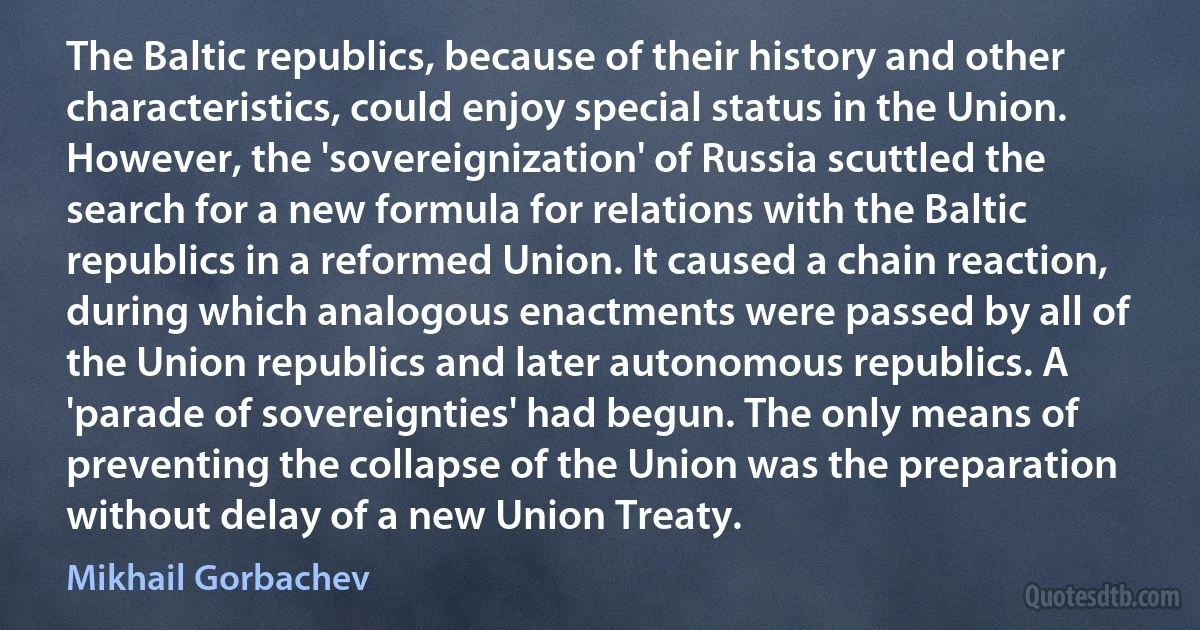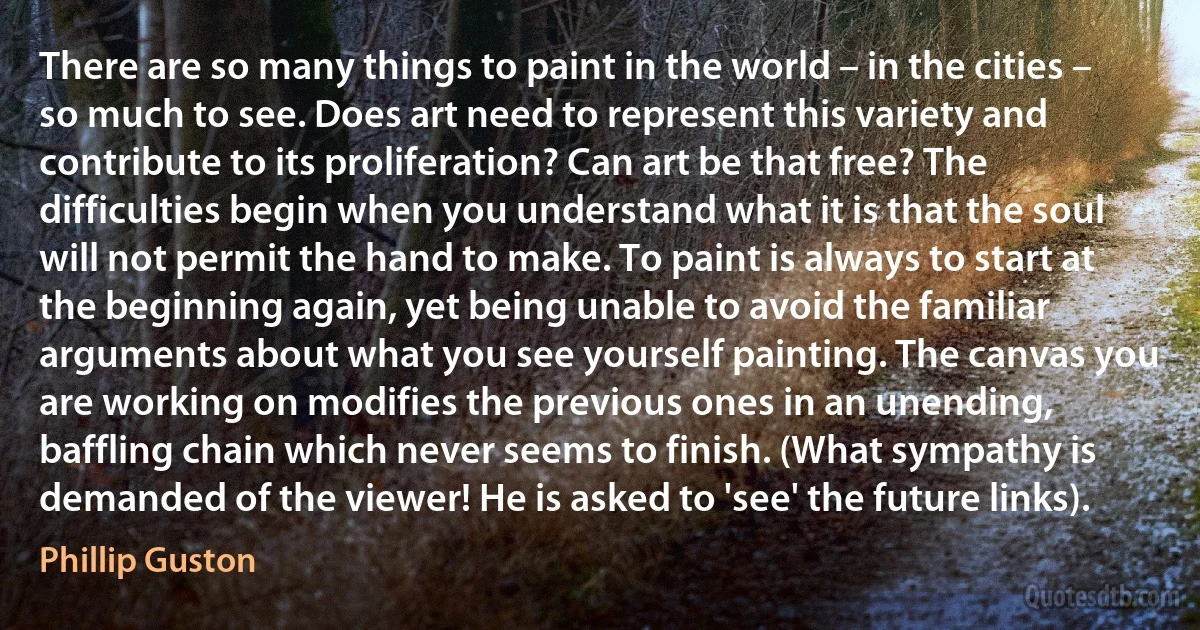Chain Quotes - page 21
What's happened is, for 300 years people basically said, "If you want to make a model of things in the world, mathematical equations are the best place to go. In the last 15 years: it doesn't happen. New models... most often are made with programs, not with equations. ...Was that ...going to happen anyway? Was that a consequence of my particular work and my particular book? It's hard to know for sure. ...Was there a chain of academic references? Probably not.

Stephen Wolfram
[F]iguring out where those pockets [of reducibility] are... is an essential thing... in science. ...If you just pick an arbitrary thing and say, "What's the answer to this question?" That question may not be one that has a computationally reducible answer. ...If you ...walk along the series of questions... you can go down this chain of reducible, answerable things, but if you just... pick a question at random... most likely it will be irreducible. ...When we engineer things, we tend to ...keep in this zone of reducibility. When we're thrown things by the natural world... [we're] not at all certain that we will be kept in this... zone...

Stephen Wolfram
Here sits the Unicorn;
Leashed by a chain of gold
To the pomengranate tree.
So light a chain to hold
So fierce a beast;
Delicate as a cross at rest
On a maiden's breast.
He could snap the golden chain
With one toss of his mane,
If he chose to move,
If he chose to prove
His liberty.
But he does not choose
What choice would lose.
He stays, the Unicorn,
In captivity.

Anne Morrow Lindbergh
The Declaration of Independence announces the sublime truth, that all power comes from the people. This was a denial, and the first denial of a nation, of the infamous dogma that God confers the right upon one man to govern others. It was the first grand assertion of the dignity of the human race. It declared the governed to be the source of power, and in fact denied the authority of any and all gods. Through the ages of slavery - through the weary centuries of the lash and chain, God was the acknowledged ruler of the world. To enthrone man, was to dethrone God.

Robert G. Ingersoll
Let us proclaim it aloud, let us proclaim it in our fall and in our defeat, this is the greatest of all ages! and do you know the reason why? because it is the mildest. This age, the immediate issue, the firstborn offspring, of the French Revolution, frees the slave in America, raises from his degradation the pariah in Asia, abolishes the suttee in India, and extinguishes in Europe the last brands of the stake, civilizes Turkey, carries the Gospel into the domain of the Koran, dignifies woman, subordinates the right of the strongest to that of the most just, suppresses pirates, mitigates sentences, makes the galleys healthy, throws the red-hot iron into the sewer, condemns the penalty of death, removes the ball and chain from the leg of the convict, abolishes torture, degrades and brands war, stifles Dukes of Alva and Charles the Ninths, and extracts the claws of tyrants. Conclusion, Part Second, II.

Victor Hugo
On the same sod, where (Rapine's helpless prey,)
The plumed Indian, pin'd his life away,
Enslav'd, degraded, doom'd to vile employ,
Deploring still the rifled hive of joy,
There the poor Negro, shackled with the chain,
Rears, by his sweltering toil, the nectar'd cane;
And, wretched exile from his brighter skies,
Breathes o'er the native's grave complaining sighs,
Unconscious on what dust he treads, nor knows
Whose place he takes, whose heritage of woes.

Elizabeth Benger
I have warred with a World which vanquished me only
When the meteor of conquest allured me too far;
I have coped with the nations which dread me thus lonely,
The last single Captive to millions in war.
Farewell to thee, France!-but when Liberty rallies
Once more in thy regions, remember me then,-
The Violet still grows in the depth of thy valleys;
Though withered, thy tear will unfold it again-
Yet, yet, I may baffle the hosts that surround us,
And yet may thy heart leap awake to my voice-
There are links which must break in the chain that has bound us,
Then turn thee and call on the Chief of thy choice!

Lord Byron
Titan! to whom immortal eyes
The sufferings of mortality
Seen in their sad reality,
Were not as things that gods despise;
What was thy pity's recompense?
A silent suffering, and intense;
The rock, the vulture, and the chain,
All that the proud can feel of pain,
The agony they do not show,
The suffocating sense of woe,
Which speaks but in its loneliness,
And then is jealous lest the sky
Should have a listener, nor will sigh
Until its voice is echoless.

Lord Byron
I fell into a reverie, and lo, the atoms were gamboling before my eyes. Whenever, hitherto, these diminutive beings had appeared to me, they had always been in motion. Now, however, I saw how, frequently, two smaller atoms united to form a pair: how a larger one embraced the two smaller ones; how still larger ones kept hold of three or even four of the smaller: whilst the whole kept whirling in a giddy dance. I saw how the larger ones formed a chain, dragging the smaller ones after them but only at the ends of the chains.

August Kekulé
I think the first reason that we should love our enemies, and I think this was at the very center of Jesus' thinking, is this: that hate for hate only intensifies the existence of hate and evil in the universe. If I hit you and you hit me and I hit you back and you hit me back and go on, you see, that goes on ad infinitum. It just never ends. Somewhere somebody must have a little sense, and that's the strong person. The strong person is the person who can cut off the chain of hate, the chain of evil. And that is the tragedy of hate, that it doesn't cut it off. It only intensifies the existence of hate and evil in the universe. Somebody must have religion enough and morality enough to cut it off and inject within the very structure of the universe that strong and powerful element of love.

Martin Luther King Jr.
The history of science is a long unbroken chain of elaboration, deviation, and rectification, re-creation, followed by reassessment, renewed deviation and rectification, and renewed creation. It has been a long, arduous course, and we have hardly begun. It adds up to a mere two thousand years, interspersed with long arid stretches. The living world is hundreds of thousands of years old and will probably go on existing for many centuries to come. Life is constantly moving forward t never backward. Life is growing ever more complex and its tempo is accelerating. Honest pioneer work in the field of science has always been and will continue to be, life's pilot. On all sides, life is surrounded by hostility. This puts us under an obligation.

Wilhelm Reich
A man offered to sell, and did sell, to Abraham and another as poor as himself, an old stock of goods, upon credit. They opened as merchants; and he says that was the store. Of course they did nothing but get deeper and deeper in debt. He was appointed postmaster at New Salem - the office being too insignificant to make his politics an objection. The store winked out. The surveyor of Sangamon offered to depute to Abraham that portion of his work which was within his part of the County. He accepted, procured a compass and chain, studied Flint and Gibson a little, and went at it. This procured bread, and kept soul and body together. The election of 1834 came, and he was then elected to the legislature by the highest vote cast for any candidate. Major John T. Stuart, then in full practice of the law, was also elected. During the canvass, in a private conversation, he encouraged Abraham to study law.

Abraham Lincoln
We should... conclude that the abandoned big-box structures will not last more than one generation under any circumstances. [...] The same thing can be said about malls, strip malls, and chain restaurant buildings. Eventually, they will be the salvage yards and mines of the future.

James Howard Kunstler


